
There is nothing more deceptive than an obvious fact.






"There is nothing more deceptive than an obvious fact." These words, penned by Arthur Conan Doyle through the voice of Sherlock Holmes, cut deep into the marrow of human understanding. The phrase speaks with ancient resonance, for it warns us that what seems most certain may blind us most completely. When the mind beholds an obvious fact, it grows lazy; it rests in false security, convinced that what is plain needs no deeper examination. Yet it is precisely in these moments of complacency that truth slips away, veiled by the comfort of the apparent.
Consider how the sages of old taught us that the eye can deceive, and the heart may be led astray by appearances. The obvious is often the mask of the hidden, and to grasp it without question is to surrender the power of discernment. The warriors of wisdom, whether philosophers of Greece or prophets of the desert, reminded their people again and again: look beyond the surface. For it is not the mountain seen from afar that destroys the traveler, but the unseen ravine at his feet.
History gives us countless examples of this truth. Take, for instance, the fall of the mighty city of Troy. To its defenders, the obvious fact was that the Greeks had departed, leaving behind only a wooden horse—a gift, perhaps a token of surrender. The Trojans, rejoicing, brought the horse within their walls. Yet in their trust of the obvious, they welcomed destruction. That night, warriors emerged from within the hollow structure, and the city was consumed by fire. Thus, what appeared to be a harmless monument was in truth a vessel of doom. The obvious fact deceived an entire civilization.
Or reflect upon the age of Galileo, when men looked to the heavens and declared with certainty that the sun revolved around the earth. To their senses, it was an obvious fact: they saw the sun rise and set, journeying across the sky. Yet it was precisely this obviousness that concealed the deeper truth—that the earth itself was moving. Centuries of thought were chained by the weight of this deception, until courage broke through the veil and truth prevailed.
The lesson is thus clear: never trust the obvious alone. Question it, probe it, wrestle with it until it yields its deeper meaning. The mind that bows too quickly to what appears certain is a prisoner; the mind that doubts, tests, and examines is free. For wisdom is not found in the brightness of the surface, but in the shadows beneath it.
To you, reader, who hears this teaching: do not be lulled by simplicity. When all seems plain, let that be the very signal to sharpen your thought. Ask: "What lies beyond? What truth hides beneath this certainty?" Cultivate the discipline of patience, of skepticism, of clarity. For only then will you avoid the snares of the deceptive obvious fact.
Practically, you may begin with small steps. When presented with information, resist the urge to accept it at once. Seek its source. Ask whether other explanations are possible. Look for what is missing, as much as for what is present. In conversation, listen for what is unsaid. In daily life, beware the gift horse, lest you invite it past your gates without question.
So let this wisdom be etched into your heart: the obvious is often the cloak of the hidden. To walk in truth is to see with more than the eyes, to hear with more than the ears, to think with more than the moment. He who learns this will not stumble upon the illusions of the world, but will stride with the clarity of one who sees beyond the veil. And such a soul, awake and discerning, cannot easily be deceived.






AAdministratorAdministrator
Welcome, honored guests. Please leave a comment, we will respond soon